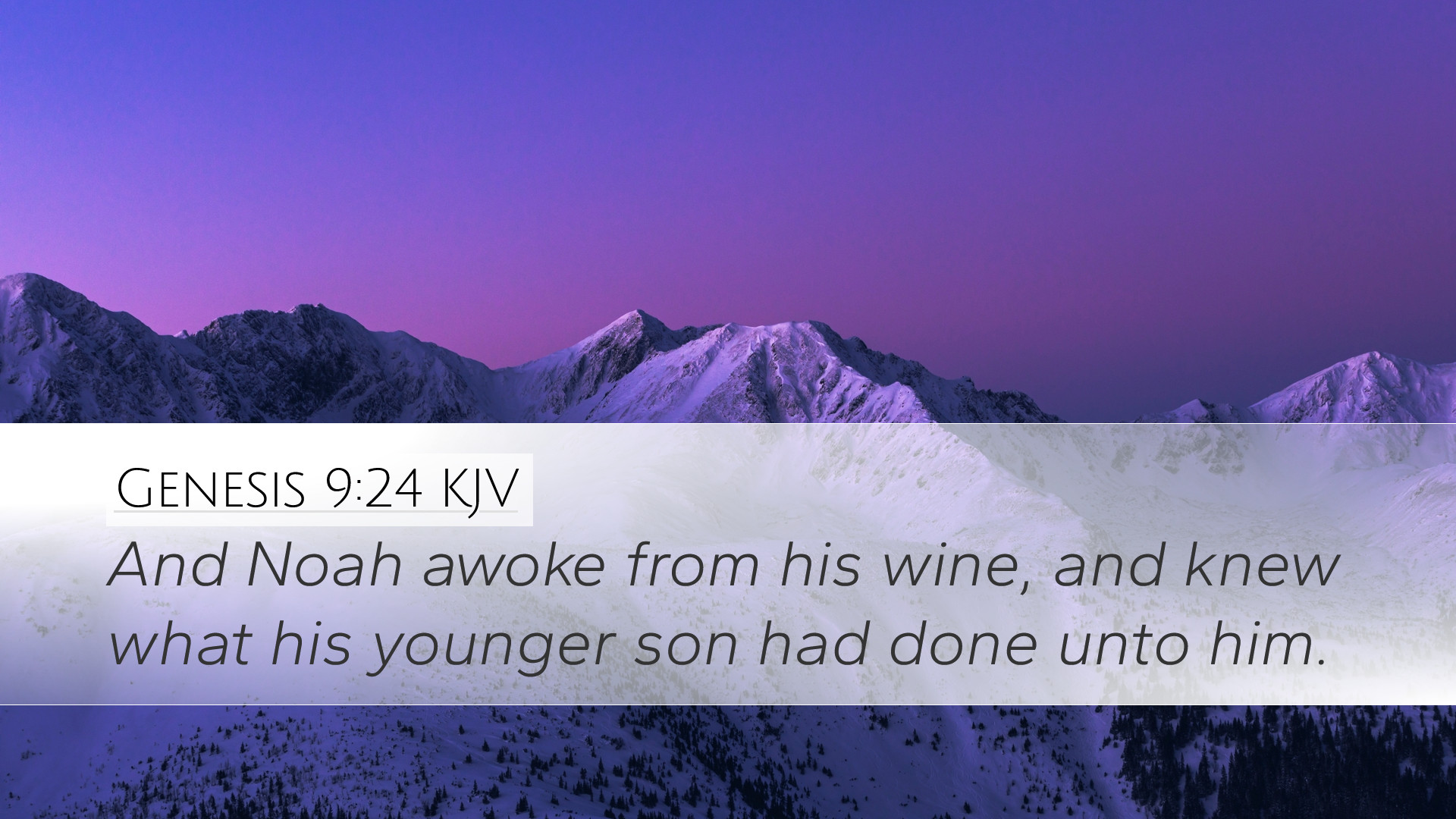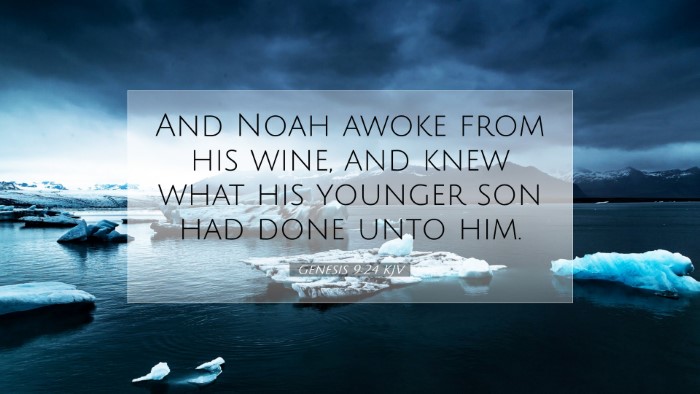Commentary on Genesis 9:24
Verse Text: "When Noah awoke from his wine and knew what his younger son had done to him," (Genesis 9:24, ESV)
Introduction
This passage reflects a complex moment in the early narrative of humanity after the Flood. Understanding Noah's reaction demands careful analysis of the characters, their actions, and the implications of these actions within the biblical narrative. In this commentary, we will delve into insights from renowned public domain commentaries by Matthew Henry, Albert Barnes, and Adam Clarke.
Contextual Background
The account takes place shortly after God establishes a covenant with Noah and his family, marking a fresh start for humanity. Following the Flood, Noah, as a newly appointed patriarch, represents both a renewal of God's purpose and a continued challenge of human sinfulness.
Matthew Henry's Insights
Henry reflects that the nature of Noah's transgression is a critical element in the narrative. Noah, in a state of intoxication, unwittingly exposes himself to his son Ham.
- Intoxication of the Progenitor: Henry views Noah's drinking and resultant shame as an allegory of the potential downfalls of humanity, even within the covenant community.
- The Response of Ham: Ham's act of mocking his father is seen as an expression of disrespect, a failure to uphold the sanctity and honor of familial relationships.
- Consequences of Dishonor: The repercussions of Ham’s actions resonate throughout the generations, highlighting the theme of familial accountability.
Albert Barnes' Commentary
Barnes adds depth by examining the consequences of Ham's actions and Noah's subsequent curse. He suggests that Ham’s indiscretion is manifold:
- Understanding of the Curse: The curse placed upon Canaan is indicative of the severe consequences of dishonoring one’s parent and the broader socio-political ramifications that arise from familial sins.
- Covenantal Implications: Barnes emphasizes that this narrative serves as a cautionary tale regarding the expectations of God’s covenant people to maintain piety and respect.
- Historical Context: The curse is also a foresight into the historical enmity between the descendants of Ham and the people of Israel, demonstrating that moral failings often yield lasting national consequences.
Adam Clarke's Contributions
Clarke focuses more extensively on the nature of Noah’s revelation upon awakening from his vine-induced stupor. He posits that:
- Spiritual Sensitivity: Noah’s awakening represents a divine illumination, leading him to understand his son’s conduct.
- Character of Ham: The examination of Ham’s character reveals a dark nature, presenting a contrast to the honor exhibited by his brothers Shem and Japheth.
- Legacy of the Cursed Line: Clarke interprets Canaan as a precursor of moral decay, showing how the behaviors established here manifest in future generations.
- Theological Reflection: This event serves as a theological teaching point for the audiences, prompting a reflection on the nature of sin, consequences, and familial obligations.
Theological Implications
The theological ramifications of Genesis 9:24 extend well beyond the narrative itself, inviting readers into discussions about human dignity, respect for authority, and the societal implications of individual actions.
- Human Dignity and Honor: The commentary points towards an intrinsic value embedded in human relationships that must be preserved through respect and honor.
- Sin's Infiltration into Humanity: The fact that Noah, a righteous man and savior of the covenant, falls into sin reflects the pervasive nature of sin post-Eden, showing that even the righteous are not immune.
- Divine Judgment and Mercy: The passage prompts reflection on God's ongoing judgment amidst mercy, not only in terms of individuals but also concerning nations.
Conclusion
Genesis 9:24 serves as a profound narrative about human frailty, the structural fabric of familial ties, and the far-reaching consequences of our actions within a covenant community. The combined insights from Henry, Barnes, and Clarke offer rich theological perspectives, prompting readers to consider their own lives in light of the reverence owed to familial, societal, and divine authority.
In closing, every pastor, student, theologian, and scholar can glean important lessons from this text, as it speaks not only to the past but also compels reflection on present-day moral and ethical human dynamics.


